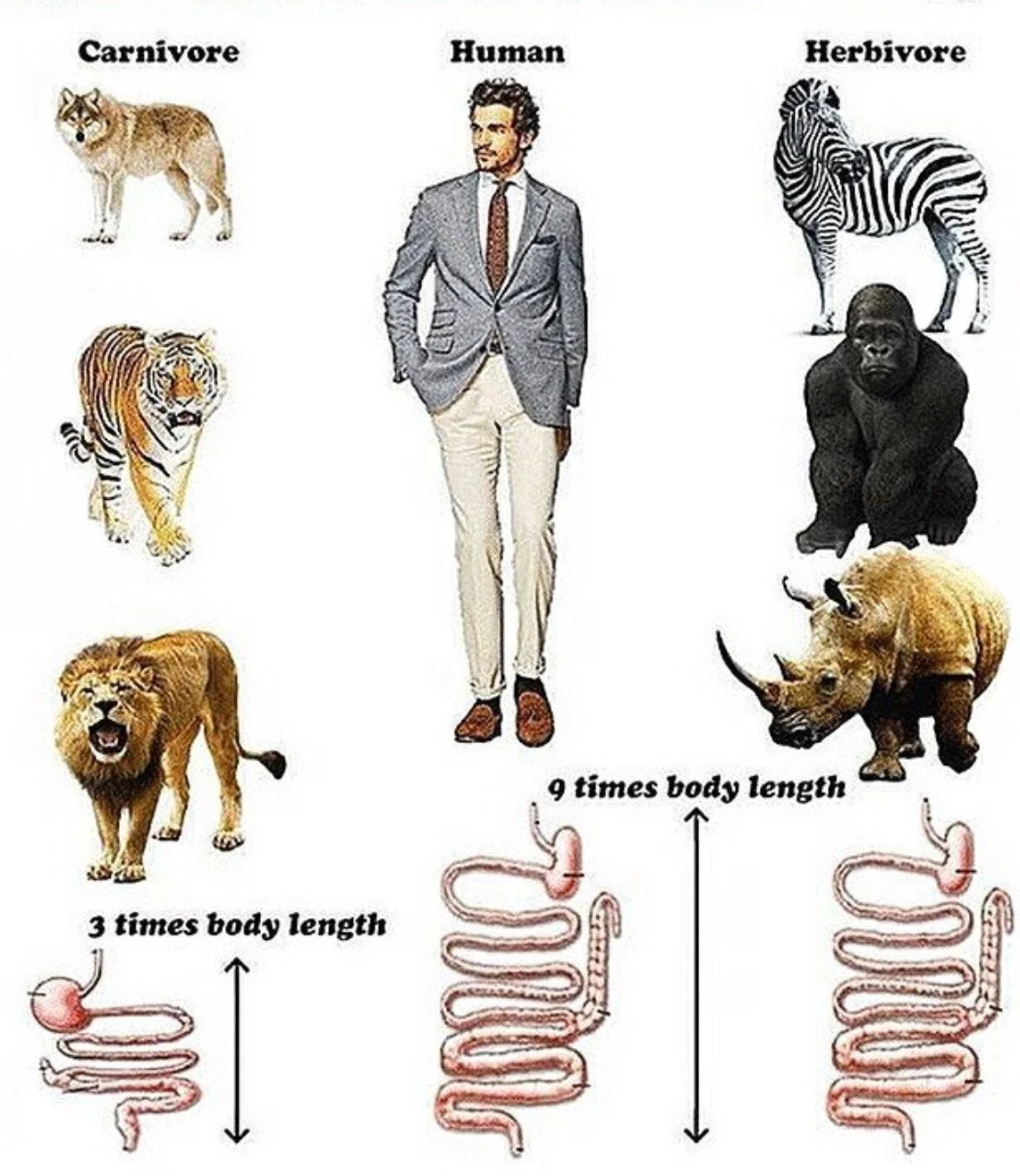Are Humans Designed to Eat Plants?
Keep reading for a shocking quote from the NIH about humans and what we’re designed to eat…
I’m really passionate about nutrition. The overwhelming evidence supporting a whole food plant based diet was actually my entry point into veganism. Animal rights and climate action came later for me.
I’ve received a lot of comments on social media lately trying to say that a vegan diet is nutritionally insufficient. But they always cite out of date or flat out wrong logic.
So let’s examine our evolution and the science behind the effects of food on our bodies.
Standard American Diet (SAD)
The top 15 leading causes of death in America are all causally linked to a diet high in animal products. You can read more about these causal links in “How Not to Die” by Dr. Michael Greger.
Studies that analyzed atherosclerosis, the number one leading killer of Americans, in subjects who died of accidents (meaning, they appeared healthy and died of accidents unrelated to health) show that fatty streaks begin to form in our arteries as early as 3 years old.
So, something about the Standard American Diet isn’t working.
Evolution of Big Brains
A common misconception is that eating meat allowed us to grow big brains, and therefore this shift in diet is the reason why we have “risen above” the animal kingdom.
Even though our brain is only about 8% of our body weight, it consumes more than 25% of our energy expenditure.
And our brain’s preferred source of energy is glucose, which is found exclusively in plants.
Starches such as potatoes and tubers provide massive amounts of glucose, but they are very difficult for our bodies to digest raw. The energy it takes to digest tough raw starches almost exceeds the calories they provide.
Until, that is…they are cooked. Cooking essentially “pre-digests” the starches, so our bodies do not have to expend massive amounts of energy for digestion.
When starches are cooked, huge amounts of glucose are available for our bodies - and critically, our brains - to utilize.
So it was the discovery and utilization of fire about 250,000 years ago and the ability to cook starches that led to the development of our big brain. Not meat.
Adaptations to Plants
Our bodies have many specialized adaptations to eating plants. Here is an excerpt from the NIH explaining that humans are indeed herbivores:
“Although most of us conduct our lives as omnivores, in that we eat flesh as well as vegetables and fruits, human beings have characteristics of herbivores, not carnivores (2). The appendages of carnivores are claws; those of herbivores are hands or hooves. The teeth of carnivores are sharp; those of herbivores are mainly flat (for grinding). The intestinal tract of carnivores is short (3 times body length); that of herbivores, long (12 times body length). Body cooling of carnivores is done by panting; herbivores, by sweating. Carnivores drink fluids by lapping; herbivores, by sipping. Carnivores produce their own vitamin C, whereas herbivores obtain it from their diet. Thus, humans have characteristics of herbivores, not carnivores.”
The NIH goes on to say that atherosclerosis, THE NUMBER ONE KILLER OF AMERICANS, only affects herbivores:
“Atherosclerosis affects only herbivores. Dogs, cats, tigers, and lions can be saturated with fat and cholesterol, and atherosclerotic plaques do not develop (1, 2). The only way to produce atherosclerosis in a carnivore is to take out the thyroid gland; then, for some reason, saturated fat and cholesterol have the same effect as in herbivores.”
So according to the NIH, the government health research agency: we are not carnivores. We are not omnivores. We are herbivores.
Humans are herbivores, meaning we evolved to eat exclusively plants. More specifically within the umbrella of “herbivore,” we are “frugivores.”
And this makes sense. The longest living populations in the world - otherwise known as the “Blue Zones” - are all predominantly whole food plant based.
People who follow a whole food plant based diet enjoy a 400 - 500% decrease in all-cause mortality risk (risk of dying from all causes such as heart disease, diabetes, cancer, alzhiemer’s, etc).
Dairy and Eggs
Dairy and eggs had no place in the evolution of humans until the agricultural revolution 11,000 years ago.
Until humans transitioned into sedentary living, we were not able to cultivate dairy or eggs. Before the agricultural revolution, the only “milk” humans consumed was human breast milk in infancy.
In fact, the natural state of adult humans is lactose intolerance. On average, 60% of caucasians, 80% of blacks, and 90% of asians are lactose intolerant in adulthood.
And again, this makes sense. Why would we need the ability to digest lactose once we stop breast feeding?
Grey areas have no reported data.
Nutrient Deficiencies?
What about all the “deficiencies” associated with a vegan diet?
This is misinformation, as well.
A common assertion is that Vitamin B12 can only be found in animal products.
This is not true.
Vitamin B12 is not made by animals. It is made by microbes that blanket the earth.
Humans used to get Vitamin B12 from consuming trace amounts of dirt, but in today’s sanitized world, that doesn’t happen anymore.
Up to 39% of people tested are deficient in Vitamin B12, including omnivores.
Farmed animals are deficient, as well. The food industry feeds farmed animals B12 supplements.
So if we are relying on animal products for Vitamin B12, we’re just getting it second-hand from a supplement!
Vitamin B12 is found in abundance in nutritional yeast, a commonly consumed food in a vegan diet.
For a piece of anecdotal evidence, I recently had my Vitamin B12 tested…
On a scale from 232 - 1245 (pg/mL), I scored 1209 (pg/mL). My doctor said that was the highest B12 score she’s ever seen, including her patients practicing an omnivorous diet.
Another common contention point is protein.
There’s a misconception that animal products have higher amounts of protein, that plant proteins are incomplete, or that somehow plant proteins are inferior.
All protein on earth is originally made by plants. Not animals.
Only plants have the ability to extract nitrogen from the soil and synthesize it into amino acids.
All plants contain all 9 essential amino acids in varying quantities. All plants are complete proteins.
Some plants are higher or lower in certain essential amino acids. But if you eat a variety of plants, as we evolved doing, we will get all the protein we need.
In fact, on average, vegans have higher levels of protein circulating in their blood than do omnivores.
The biggest, strongest animals on earth are all herbivores (think - gorillas, elephants, rhinos).
Carnivores like lions or tigers are actually kind of puny in comparison.
Nimai Delgado, vegan body builder. Since birth, Nimai has never eaten meat in his entire life.
Personally, I follow a very intense bodybuilding regimen. I have to consume about 3X the daily recommended amount of protein for women. And I have no problem hitting that goal with whole plant foods. I don’t even use protein powders.
There is no evidence supporting the assertion that animal proteins are higher quality than plant proteins.
Furthermore, it’s important to consider what “package” our protein is delivered in.
With plant proteins, our protein is packaged with phytonutrients, antioxidants, and anti-inflammatory compounds.
With animal proteins, our protein is packaged with cholesterol, saturated fats, inflammatory compounds, and carcinogens.
The World Health Organization classifies processed meats as a Class 1 carcinogen. Meaning that processed meats cause cancer as much as cigarettes and asbestos cause cancer.
Red meat is a Class 2 carcinogen. Meaning that red meat causes cancer as much as sexually transmitted disease, HPV.
Yikes…
When we take the “package” logic into consideration, it actually appears that plant proteins are superior to animal proteins.
Is a Vegan Diet Sacrificing our Health?
The American Dietetics Association, the largest association of dietitians in the world, has stated that a plant based diet is healthy at all stages of life, including pregnancy and childhood.
So a vegan diet is not a sacrifice for the animals.
A properly planned vegan diet that includes as many whole plant foods as possible is not only healthy for humans, but it’s what we were designed by evolution to eat.
Even the NIH clearly and emphatically asserts: humans are herbivores.
A plant based diet is healthy for us, healthy for the planet, and healthy for our animal friends.
With a plant based diet, everyone wins!
Sources
King’s College London, as seen in The Game Changers





